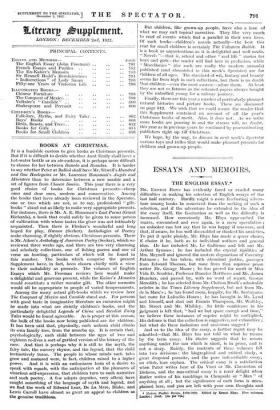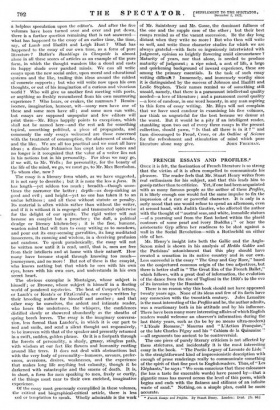ESSAYS AND MEMOIRS.
THE ENGLISH ESSAY.*
Mn. ERNEST BUYS has evidently faced or evaded many difficulties in making his selection of English essays of the last half century. Hardly might a more fascinating adven- ture among books be conceived than the making of such a selection, and if the adventure be extended to the idea of the essay itself, the fascination as well as the difficulty is increased. How consciously Mr. Rhys approached the snares, succumbed and rose again, is a mere speculation ; an onlooker can but say that he was happy if unaware, and that, if aware, he has well dissembled or cloaked his anxieties. To put it quite plainly, Mr. Rhys has made a queer choice, if choice it be, both as to individual authors and general idea. He has included Mr. Le Gallienne and left out Mr. Arthur Symons ; he has included the crystal rigidities of Mrs. Meynell and ignored the austere dogmatism of Coventry Patmore ; he has taken, with abundant justice, passages from Edward Thomas, but none from that supreme prose writer Mr. George Moore ; he has peered for merit in Miss Vida D. Scudder, Professor Brander Matthews and Mr. James Huneker, and passed by, with no word of regret, George Meredith ; he has selected from Mr. Clutton Brock's admirable articles in the Times Literary Supplement, but not from Mr. de la Marc's; he has found room, happily, for Mr. Santayana. but none for Lafcadio Hearn ; he has brought in Mr. Lynd and himself, and shut out Francis Thompson, Mr. Walklcy, Mr. Street and Mr. Whibley. So little confidence in his judgment is left that, "had we but space enough and time," we believe these instances of caprice might be multiplied. His defence is that the collection is suggestive, not exhaustive ; but what do these inclusions and omissions suggest ?
And as to the idea of the essay, a farther regret may be admitted—that Mr. Rhys has not told us what he means by the term essay. His choice suggests that he means anything under the sun which is short, is in, prose, and is not a story. Mainly, the contents of these volumes fall into two divisions : the biographical and critical study, a great dropsical parasite, and the pure indescribable essay, an elfish, lean orphan. The critical essay is a satisfaction when Pater writes here of Da Vinci or Mr. Chesterton of Dickens, and the non-critical essay is a rarer delight when Butler writes of his ramblings in Cheapsidc or " Max " of anything at all ; but the significance of each form is unex.. plained here, and you are left 'with your own thoughts- and
• Modern Englialt Snare, 1870-1920. Edited by Ernest Ithys. Five voinmee• Loam; Dent, ids. Per voLl
a helpless speculation upon the editor's. And after the five volumes have been turned over and over and put down, there is a further question remaining that is not answered— what has happened to the essay of an earlier time, the time, say, of Lamb and Hazlitt and Leigh Hunt ? What has happened to the essay of our own time, as a form of pure literature ? Butler's Ramblings in Cheapside is almost alone in all these scores of articles as an example of the pure form, in which the thought wanders like a cloud and casts its happy shade over parched minds. We can all write essays upon the new social order, upon moral and educational systems and the like, trailing thin ideas around the coldest of concrete supports ; but who will write now upon his own thoughts, or out of his imagination of a curious and vivacious world ? Who will give us another first meeting with poets, or anything so freshly remembered from his own murmuring experience ? Who hears, or evokes, the murmurs ? Remin- iscence, imagination, humour, wit—many men have one of these and some men have all ; and some men can write, but essays are supposed unpopular and few editors will print them—Mr. Rhys happily points to exceptions, which shall not be named here—and the rest ask for something topical, something political, a piece of propaganda, and commonly the only essays welcomed are those concerned with the treatment of consumption, the abatement of smoke, and the like. We are all too practical and we must all have ideas ; a dissolute Fabianism has crept into our bones and no longer is it recognized that the value of a writer lies not in his notions but in his personality. For ideas we may go, if we will, to Mr. Wells ; for personality, for the beauty of the life of the mind, we go, we must go, to Mr. Max Beerbohm. To whom else, now ?
The essay is a literary form which, as we have suggested, it is not easy to describe ; but it is none the less a farm. It has length—yet seldom too much ; breadth—though some- times the narrower the better ; depth—as deep-sinking as good and evil ; and height—yet no one has taken it to an undue loftiness ; and all these without statute or penalty. Its material is often within rather than without the writer, and if it is without it is engorged and transmuted spiderwise for the delight of our spirits. The rigid writer will not become an essayist but a preacher ; the dull, a political drudge or literary kitchen-boy; it is the free, humane, wanton mind that will turn to essay writing as to meadows, and pour out its easy-seeming garrulities, its long meditated innocences, its cunning and wisdom, in a deceiving profusion and candour. To speak paradoxically, the essay will not be written now until it is read, until, that is, men are free from their intellects and at home with their natureT. How many have become stupid through knowing too much— journeymen, and no more ! But not of these is the essayist, who knows nothing but that which he sees with his own eyes, hears with his own ears, and understands in his own secret heart.
The obvious exemplar is Montaigne, whose subject is himself ; or Browne, whose subject is himself in a fleeting world of pondered mysteries. The best of Cowper's letters, or Lamb's or Keats's or FitzGerald's, arc essays written by their brooding author for himself and another ; and that other may be ourselves, the ardent and intimate reader, who hears the undertones, the whispers, the confidences distilled slowly or showered abundantly as the sheaths of spring beech leaves. The essay is the imaginary conversa- tion, less formal than Landor's, in which it is our part to nod and smile, and send a silent thought out responsively, to be inwoven with that of the speaker and presently returned in a swift, sudden, golden phrase. Or it is a footpath through the forests of personality, a shady, grassy, stingless path, with wisdom at our feet like flowers and humanity rustling around like trees. It does not deal with abstractions but with the very body of personality—humours, savours, prefer- ences, aversions, desires, weaknesses, and the experience that makes long life anything but calamity, though it be darkened with catastrophe and the omens of death. It is, in short, a form for men speaking to men, freely or curtly, of the things most near to their own enriched, imaginative experience.
Of the essay most generously exemplified in these volumes, the critical and biographical-critical article, there is less ced or temptation to speak. Wholly admirable is the work
of Mr. Saintsbury and Mr. Gosse, the dominant fullness of the. one and the supple ease of the other ; but their best essays remind us of the vacant succession. Be the day long distant when they write no more I But who then will write so well, and write those character studies for which we are always grateful—with facts so ingeniously. intertwisted with judgment, opinion so brightly flowering amid circumstance ? Maturity of years, nor that alone, is needed to produce maturity of judgment ; a ripe mind, a zest of life, a large and quickening background of inward experience, these are among the primary essentials. Is the task of such essay writing difficult? Immensely, and immensely worthy since it is distinguished by the success of Johnson and Hazlitt and Leslie Stephen. Their names remind us of something still unsaid, namely, that there is a paramount intellectual quality needed—a love of literature ; and a paramount moral quality —a love of candour, in one word honesty, in any man aspiring to this form of essay writing. Mr. Rhys will not complain that we have used candour in examining his five volumes, nor think us ungrateful for the best because we demur at the worst. But it would be a pity if an intelligent reader, stumbling upon two out of every three essays in the present collection, should yawn, "Is that all there is in it ? " and turn discouraged to Freud, Croce, or An Outline of Science for the refreshment and stimulation of mind which pure







































































 Previous page
Previous page